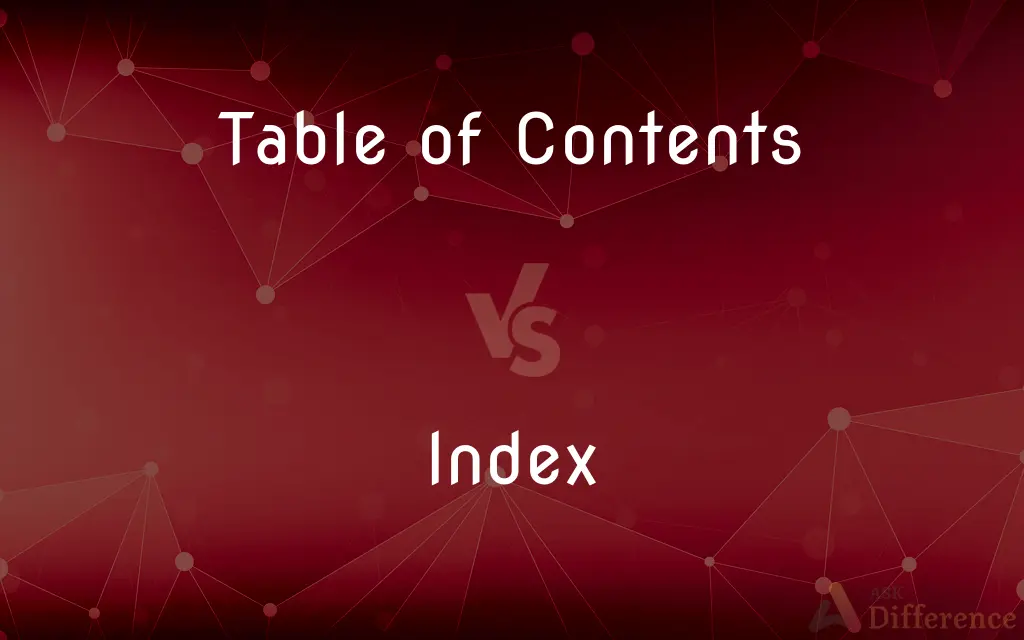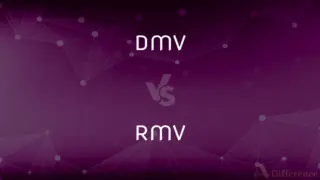Table of Contents vs. Index — What's the Difference?
By Tayyaba Rehman — Published on October 16, 2023
Table of Contents lists the sections and chapters of a book in order; Index alphabetically lists topics and keywords with page numbers.

Difference Between Table of Contents and Index
Table of Contents
ADVERTISEMENT
Key Differences
The Table of Contents and Index are integral components of a book, each serving distinct functions in navigating through the content. The Table of Contents typically appears at the beginning of a book, providing a structured outline of the main sections, chapters, and sub-chapters, including their respective page numbers. This allows readers to quickly locate and access specific sections of the book, making the reading experience more efficient and user-friendly.
In contrast, the Index is situated at the end of a book and serves as a detailed alphabetical listing of topics, terms, and keywords found within the book, along with their corresponding page numbers. The Index aids readers in pinpointing precise information or specific references to a topic, enabling a more focused and targeted approach to finding content within the book.
While the Table of Contents offers a sequential representation of the book's structure, the Index provides a comprehensive and detailed guide to the book’s content, focused on specific terms and subjects. The Table of Contents is crucial for understanding the overall layout and organization of the book, whereas the Index is essential for locating specific information or references quickly and efficiently.
Both the Table of Contents and the Index are indispensable navigational tools, each enhancing the usability and accessibility of a book in their unique ways. The Table of Contents provides a high-level overview of the book's structure and content, while the Index offers a more granular and detailed insight into the topics and terms covered within the book, making them complementary to each other.
Comparison Chart
Location
Typically found at the beginning of the book.
Located at the end of the book.
ADVERTISEMENT
Purpose
Provides a structured outline of the book's sections and chapters.
Lists topics, terms, and keywords alphabetically.
Usage
Helps in understanding the overall layout and structure of the book.
Aids in locating specific information or references within the book.
Organization
Organized sequentially.
Organized alphabetically.
Detail
Offers a high-level overview of content.
Provides detailed insight into topics covered.
Compare with Definitions
Table of Contents
Table of Contents outlines the main organizational structure of the book.
The Table of Contents showed a detailed breakdown of all the topics covered.
Index
An Index is an alphabetical list of topics, terms, and keywords found in a book, along with page numbers.
To find specific terms or topics, refer to the Index at the end of the book.
Table of Contents
Table of Contents assists readers in navigating through the book’s sections efficiently.
By consulting the Table of Contents, I could easily jump to the desired chapter.
Index
An alphabetized list of names, places, and subjects treated in a printed work, giving the page or pages on which each item is mentioned.
Table of Contents
Table of Contents provides a quick overview of the book’s content.
A glance at the Table of Contents gave me an idea of what to expect from the book.
Index
A thumb index.
Table of Contents
The Table of Contents is an ordered list of the book's sections and chapters with page numbers.
Refer to the Table of Contents to find the chapter on cellular biology.
Index
A table, file, or catalog.
Table of Contents
The Table of Contents is typically found at the beginning of a book.
Upon opening the book, the Table of Contents listed all the chapters in sequential order.
Index
(Computers) A list of keywords associated with a record or document, used especially as an aid in searching for information.
Index
Something that reveals or indicates; a sign
"Her face ... was a fair index to her disposition" (Samuel Butler).
Index
A character (☞) used in printing to call attention to a particular paragraph or section. Also called hand.
Index
An indicator or pointer, as on a scientific instrument.
Index
(Mathematics) A number or symbol, often written as a subscript or superscript to a mathematical expression, that indicates an operation to be performed, an ordering relation, or a use of the associated expression.
Index
A number derived from a formula, used to characterize a set of data.
Index
A statistical value that represents the price or value of an aggregate of goods, services, wages, or other measurable quantities in comparison with a reference number for a previous period of time.
Index
A number that represents the change in price or value of stocks or other securities in a particular market, sector, or asset class.
Index
The stocks or other securities represented by an index.
Index
Index Roman Catholic Church A list formerly published by Church authority, restricting or forbidding the reading of certain books.
Index
To furnish with an index
Index a book.
Index
To enter in an index.
Index
To indicate or signal.
Index
To adjust through indexation.
Index
An alphabetical listing of items and their location.
The index of a book lists words or expressions and the pages of the book upon which they are to be found.
Index
The index finger; the forefinger.
Index
A movable finger on a gauge, scale, etc.
Index
(typography) A symbol resembling a pointing hand, used to direct particular attention to a note or paragraph.
Index
That which points out; that which shows, indicates, manifests, or discloses.
Index
A sign; an indication; a token.
Index
(linguistics) A type of noun where the meaning of the form changes with respect to the context; e.g., 'Today's newspaper' is an indexical form since its referent will differ depending on the context. See also icon and symbol.
Index
(economics) A single number calculated from an array of prices or of quantities.
Index
(science) A number representing a property or ratio; a coefficient.
Index
(mathematics) A raised suffix indicating a power.
Index
An integer or other key indicating the location of data, e.g. within an array, vector, database table, associative array, or hash table.
Index
A data structure that improves the performance of operations on a table.
Index
(obsolete) A prologue indicating what follows.
Index
(transitive) To arrange an index for something, especially a long text.
MySQL does not index short words and common words.
Index
To inventory; to take stock.
Index
To normalise in order to account for inflation; to correct for inflation by linking to a price index in order to maintain real levels.
Index
To measure by an associated value.
Index
To be indexical for (some situation or state of affairs); to indicate.
Index
(computing) To access a value in a data container by an index.
Index
That which points out; that which shows, indicates, manifests, or discloses; as, the increasing unemployment rate is an index of how much the economy has slowed.
Tastes are the indexes of the different qualities of plants.
Index
That which guides, points out, informs, or directs; a pointer or a hand that directs to anything, as the hand of a watch, a movable finger or other form of pointer on a gauge, scale, or other graduated instrument.
Index
A table for facilitating reference to topics, names, and the like, in a book, usually giving the page on which a particular word or topic may be found; - usually alphabetical in arrangement, and printed at the end of the volume. Typically found only in non-fiction books.
Index
A prologue indicating what follows.
Index
The second finger, that next to the pollex (thumb), in the manus, or hand; the forefinger; index finger.
Index
The figure or letter which shows the power or root of a quantity; the exponent.
Index
The ratio, or formula expressing the ratio, of one dimension of a thing to another dimension; as, the vertical index of the cranium.
Index
A number providing a measure of some quantity derived by a formula, usually a form of averaging, from multiple quantities; - used mostly in economics; as, the index of leading indicators; the index of industrial production; the consumer price index. See, for example, the consumer price index.
Index
A file containing a table with the addresses of data items, arranged for rapid and convenient search for the addresses.
Index
A number which serves as a label for a data item and also represents the address of a data item within a table or array.
Index
The Index prohibitorius, a catalogue of books which are forbidden by the church to be read; also called Index of forbidden books and Index Librorum Prohibitorum.
Index
To provide with an index or table of references; to put into an index; as, to index a book, or its contents.
Index
To adjust (wages, prices, taxes, etc.) automatically so as to compensate for changes in prices, usually as measured by the consumer price index or other economic measure. Its purpose is usually to copensate for inflation.
Index
To insert (a word, name, file folder, etc.) into an index or into an indexed arrangement; as, to index a contract under its date of signing.
Index
A numerical scale used to compare variables with one another or with some reference number
Index
A number or ratio (a value on a scale of measurement) derived from a series of observed facts; can reveal relative changes as a function of time
Index
A mathematical notation indicating the number of times a quantity is multiplied by itself
Index
An alphabetical listing of names and topics along with page numbers where they are discussed
Index
The finger next to the thumb
Index
List in an index
Index
Provide with an index;
Index the book
Index
Adjust through indexation;
The government indexes wages and prices
Index
Index aids in locating specific information within a book quickly.
I used the Index to find every page containing references to quantum physics.
Index
The Index is usually located at the end of a book.
The Index at the back of the book listed all the keywords alphabetically.
Index
An Index provides detailed insight into the subjects and terms covered in the book.
The comprehensive Index allowed me to research various topics in depth.
Index
Index is a valuable tool for finding precise references in a book.
The Index helped me locate the exact page where the author discussed photosynthesis.
Common Curiosities
What is the Index used for?
The Index is used to locate specific topics, terms, and keywords within a book quickly.
What is the purpose of the Table of Contents?
The Table of Contents provides a structured outline of the book's sections and chapters, helping readers navigate through the book.
Where can the Table of Contents be found in a book?
The Table of Contents is typically located at the beginning of a book.
How is the Table of Contents organized?
The Table of Contents is organized sequentially, listing sections and chapters in the order they appear in the book.
Where is the Index usually located?
The Index is usually located at the end of a book.
How is the Index organized?
The Index is organized alphabetically, listing topics, terms, and keywords.
Does the Table of Contents list page numbers?
Yes, the Table of Contents typically lists the starting page number for each section or chapter.
Does every book have a Table of Contents?
Most books, especially non-fiction, have a Table of Contents, but it may not be present in some novels or shorter works.
Is the Index comprehensive?
The Index is usually comprehensive, detailing the various topics, terms, and keywords found within the book.
Is an Index present in every book?
Not all books have an Index; it is more commonly found in academic, reference, and non-fiction books.
Is the Table of Contents detailed?
The Table of Contents provides a high-level overview, and its level of detail can vary depending on the book.
Can the Table of Contents help in understanding the book's structure?
Yes, the Table of Contents provides an overview of the book's organizational structure.
Is the Index useful for detailed research within the book?
Yes, the Index is invaluable for locating detailed and specific information on various topics within the book.
Does the Index list page numbers?
Yes, the Index lists the page numbers where each listed topic, term, or keyword can be found.
Share Your Discovery

Previous Comparison
DMV vs. RMV
Next Comparison
Left Wing vs. Right WingAuthor Spotlight
Written by
Tayyaba RehmanTayyaba Rehman is a distinguished writer, currently serving as a primary contributor to askdifference.com. As a researcher in semantics and etymology, Tayyaba's passion for the complexity of languages and their distinctions has found a perfect home on the platform. Tayyaba delves into the intricacies of language, distinguishing between commonly confused words and phrases, thereby providing clarity for readers worldwide.












































